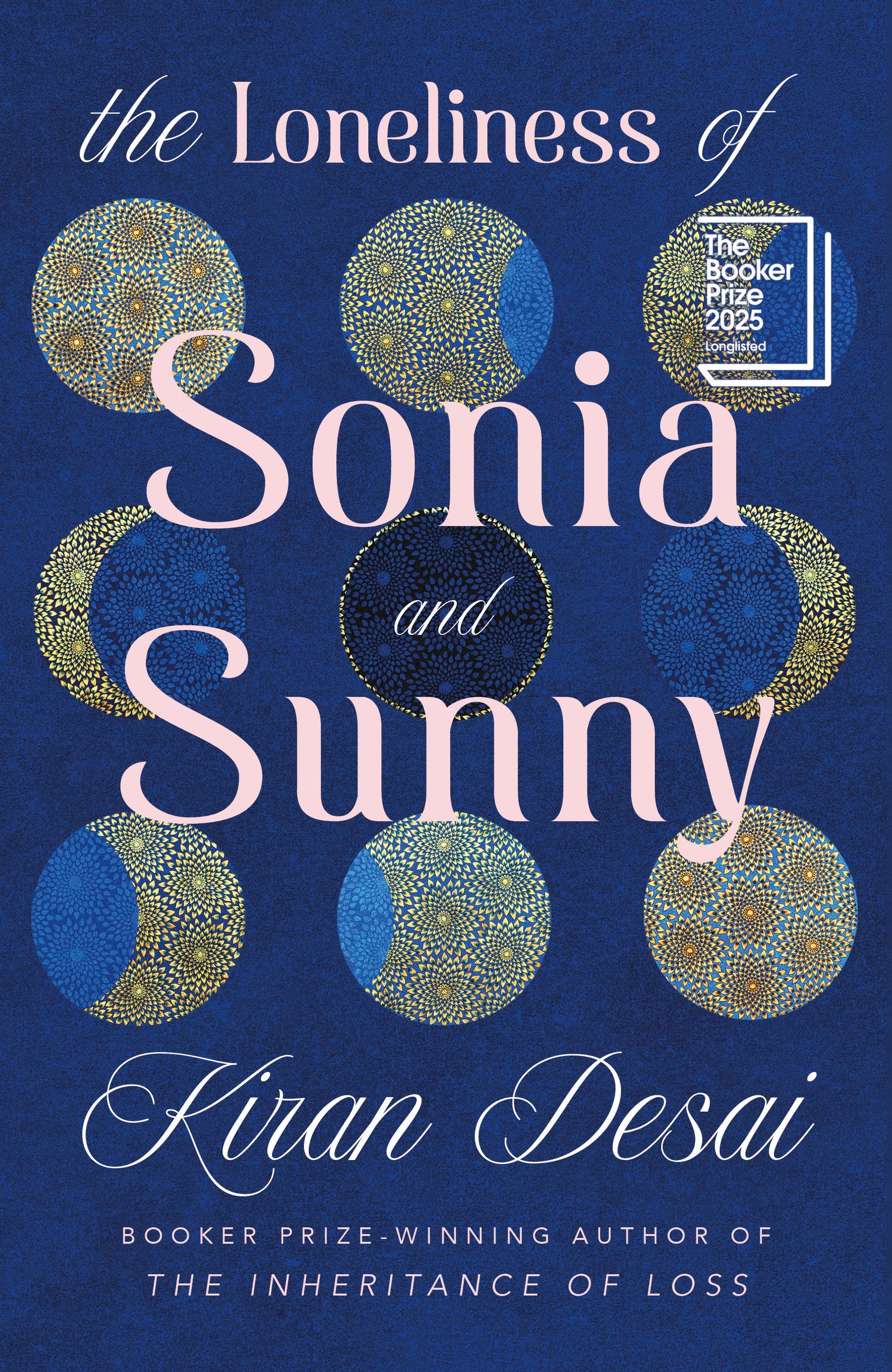The Loneliness of Sonia and Sunny
Kiran Desai
HAMISH HAMILTO N an imprint of
HAMISH HAMILTON
UK | USA | Canada | Ireland | Australia India | New Zealand | South Africa
Hamish Hamilton is part of the Penguin Random House group of companies whose addresses can be found at global.penguinrandomhouse.com.
Penguin Random House UK , One Embassy Gardens, 8 Viaduct Gardens, London SW 11 7BW penguin.co.uk
First published in the United States of America by Hogarth, an imprint of Random House, a division of Penguin Random House LLC 2025 First published in Great Britain by Hamish Hamilton 2025 001
Copyright © Kiran Desai, 2025
The moral right of the author has been asserted Title page art from Adobe Istock
Penguin Random House values and supports copyright. Copyright fuels creativity, encourages diverse voices, promotes freedom of expression and supports a vibrant culture. Thank you for purchasing an authorized edition of this book and for respecting intellectual property laws by not reproducing, scanning or distributing any part of it by any means without permission. You are supporting authors and enabling Penguin Random House to continue to publish books for everyone. No part of this book may be used or reproduced in any manner for the purpose of training artificial intelligence technologies or systems. In accordance with Article 4(3) of the DSM Directive 2019/790, Penguin Random House expressly reserves this work from the text and data mining exception
Printed and bound in Great Britain by Clays Ltd, Elcograf S.p.A.
The authorized representative in the EEA is Penguin Random House Ireland, Morrison Chambers, 32 Nassau Street, Dublin D 02 YH 68
A CIP catalogue record for this book is available from the British Library
HARDBACK ISBN : 978–0–241–77082–5
TRADE PAPERBACK ISBN : 978–0–241–77084–9
Penguin Random House is committed to a sustainable future for our business, our readers and our planet. This book is made from Forest Stewardship Council® certified paper.
In memory of my father
SONIA’S MOTHER
Seher (Mama)
Family of Sonia Shah
SONIA’S PATERNAL GRANDFATHER
Dadaji
Sonia
SONIA’S PATERNAL GRANDMOTHER
Ba
SONIA’S FATHER
Manav (Papa)
ALLAHABAD HOUSE STAFF
Khansama
Ayah Dari
DELHI HOUSE STAFF
Chandu
Balbir Singh
SONIA’S FRIENDS
Audrey Armando
SEHER’S FATHER
Siegfried Barbier
Illan de Toorjen Foss
Family of Barbier
SEHER’S MOTHER
Anjolie Roy
Seher Meher
HOUSE STAFF
SONIA’S PATERNAL AUNT
Mina Foi
SHAH FRIENDS
Khushi and Dilip
Margo and Jehangir
Daljit and Neil Ferooza
SONIA’S EMPLOYERS
Lala Marie
SEHER’S MATERNAL UNCLE
Bibhu Roy
Moolchand CAT
Babayaga
SUNNY’S MATERNAL GRANDFATHER
Nana (the Colonel)
Family of Sunny Bhatia
SUNNY’S MOTHER
Babita
SUNNY’S MATERNAL GRANDMOTHER
Nani
BABITA’S FRIENDS
Sara and Murad Habib
Vanya
Umberto
DELHI HOUSE STAFF
Vinita and Punita
Gunja
Allahabad driver
Bahadur
SUNNY’S FATHER
Ratan
GOA HOUSE STAFF
Olinda
Naresh
SUNNY’S PATERNAL GRANDMOTHER
Minnie Bhatia
SUNNY’S PATERNAL UNCLES
Rana
Ravi
UNCLE RANA’S SONS
Chiki and Chika
SUNNY’S GIRLFRIEND
Ulla
SUNNY’S FRIENDS
Satya and Pooja
Pasha
DOG
Part I
Lonely? Lonely?
The sun was still submerged in the wintry murk of dawn when Ba, Dadaji, and their daughter, Mina Foi, wrapping shawls closely about themselves, emerged upon the veranda to sip their tea and decide, through vigorous process of elimination, their meals for the rest of the day. Orders must be given to the cook at breakfast so that he could go directly to market. It was Mina’s fifty-fifth birthday, the first of December in the year 1996, and the mutton for the dinner kebabs had been marinating overnight in the kitchen.
“Rice?” Ba shouted. “Roti?” She was growing deaf, but she knew she must raise her voice over the morning traffic thundering past the front gate and the cawing of hundreds of crows—their racket and the sun’s struggle so closely linked, it was as if each morning the crows gave birth to the light. “Pilau?” she suggested. “Paratha?”
Perched above them, at the entrance portico, sat a plaster bust of a portly gentleman in a cravat, perhaps inspired by a drawing made by the bungalow’s original owner, who had toured Europe, sketchbook in hand, in the same manner he’d observed foreigners doing in India. And perhaps it was the fault of the artist’s rendering, or the dissonant surroundings of Allahabad, or a splattering of bird droppings, but the bust resembled less a dignified nobleman than a foolish snob with an interest in the sky overhead, which had not turned vivid for a quarter of a century. Not since the national highway had been widened to accommodate the lorries that trawled cabbages, cement, goats, wheat, and—if one was to believe the newspapers or the gossip—prostitutes and venereal disease.
Unperturbed by the fancy gentleman, or the polluting lorries, or the family upon the veranda, the crows’ kava kaw rose to crescendo.
“Cauliflower?” Ba urged. “Spinach?”
“Potato?” Dadaji said, lifting his feet off the ground. He rubbed them together as lovingly and extravagantly as if they were soft, velvet hands. “The Gujarati loves a potato more than most,” he said, as if explaining themselves to an absent anthropologist. They were a displaced family, Gujaratis marooned in the state of Uttar Pradesh. Years ago Dadaji’s law practice had brought him to the Allahabad court.
Two squat phones—one in the living room corner, one on Dadaji’s desk—rang out like toads in a swamp, trr trr trr, and they knew it would be a birthday call from Mina Foi’s brother, Manav, Dadaji and Ba’s second child. Dadaji picked up the phone on his desk and Mina Foi the extension in the living room. Ba never spoke on the phone for she had not the habit, even if she’d had the hearing.
“Long life, Mina,” Manav wished his sister.
“It’s been too long already,” said Mina Foi. She wanted to tell her brother that she hoped the missionary couple would stop by as they had last year with cookies made with chocolate chips brought from Iowa—but then they may not remember it was her birthday, and she could not remind them. She was forbidden to make telephone calls on her own because they were a useless luxury.
Dadaji discussed the rising value of one of his investments, and then, at the end of the conversation, he inquired about the health of his daughter-in-law, Seher, and his granddaughter, Sonia.
“We are worried about Sonia,” Manav answered. Sonia attended college in Vermont. “She’s fallen into a depression. She weeps on the telephone, then when we call her back a day later, the same.”
“But why?” asked Dadaji. “She’s been there three years already. Why is she suddenly crying?”
“She says she is lonely.” The last time Sonia had traveled home was two years ago.
“Lonely? Lonely?”
In Allahabad they had no patience with loneliness. They might
have felt the loneliness of being misunderstood; they might know the sucked-dead feeling of Allahabad afternoons, a tide drawn out perhaps never to return, which was a kind of loneliness; but they had never slept in a house alone, never eaten a meal alone, never lived in a place where they were unknown, never woken without a cook bringing tea or wishing good morning to several individuals:
Namaste, Khansama.
Good morning, Mummy.
Good morning, Daddy.
Mina, good morning.
Ayah, namaste—
Whenever Dadaji thought of the Wordsworth poem he had been taught in school—I wandered lonely as a cloud / that floats on high o’er vales and hills—the line struck him as so ridiculous, it made him throw back his head and guffaw so hard his upper dentures fell down with a smash. But feeling unusually generous because of the growing value of his shares, Dadaji directed Mina Foi to telephone Sonia. Because vision problems afflicted him—a detached retina, glaucoma, cataracts—he put a magnifying glass to his rheumy red eye and bent over so his nose touched the address book as he read out the number for the Hewitt College dormitory in North Hewitt. Mina Foi put her finger into the holes of the telephone dial and tried for nearly an hour to call until her finger numbed. Finally the phone rang distantly, and someone with what she assumed was a cowboy drawl answered.
Luckily Dadaji picked up the extension line. Mina Foi did not trust herself to speak to a cowboy. Her finger remained stuck up in the air with a crick.
“Hallo, hallo, please connect us to Sonia Shah, who is in room number five,” shouted Dadaji. Then when Sonia arrived at the phone booth, “What is the matter? Why is your father saying you are unhappy? Your studies are all right?”
“Yes,” said Sonia in a measly voice.
“Then? What is the problem?”
“What do you get to eat there?” Mina Foi inquired.
“Macaroni!” answered her grandfather on the phone extension.
“No, Dadaji,” answered Sonia, “the menu is very international. We have Chinese night, Mexican night.”
Mina Foi ventured, “Indian night?”
“Lunch is sometimes Tomato Tigers, which are tomatoes and cheese on a toasted English muffin with curry powder on top.”
“Never heard of such a thing!” Outrage.
“Pudding?” Mina Foi whispered.
“Brownies with ice cream, pecan pie, and blueberry pie.”
Just to contemplate such lavish mysteries made Mina Foi faint with heartbreak.
“Pie is a very American food,” Dadaji confirmed. “Well, what are you crying for, you lucky girl?”
Sonia tried to explain. “I’ve ballooned in my own head. I cannot stop thinking about myself and my problems. I’m dreading the winter. In the dark and cold, it will get worse—”
“Do some jumping jacks, get your spirits up, and then pick up your books. You have to persevere through hardship. If I hadn’t left the life I was born to, you would be in Nadiad, married at sixteen, not studying in America.”
Mina Foi’s hands strangled each other in her lap when she remembered her childhood visits to their ancestral home, where the women scrounged what was left after the men had eaten. When the girls menstruated they were banished—even from this marginal existence—to a hut at the bottom of the property, where they ate from clay dishes that were later broken upon the rubbish heap so they would not pollute the world.
Dadaji had single-handedly extracted them from such backwardness. He may be iron-willed and furious-tempered, but these were precisely the qualities that had given Ba a place at the polished mahogany dining table every day of the year. When he had retired, he’d taken her on a round-the-world trip along with his younger brother, Amal Kaka, and Amal Kaka’s wife, because Amal Kaka had not yet stolen the ancestral property and the brothers were still close.
All these years later, Ba and Dadaji could not remember a single
sight, not a monument, not a museum, but they never forgot the green muffler lost on the way to Machu Picchu or the machine that promised to deliver a recorded history of the Vatican through headphones, but when they put in the coins, it didn’t, and when they went to complain, the counter was closed for lunch. “Should we return in twenty minutes?” they had asked the guard. “Does lunch happen in twenty minutes?!” the guard had replied angrily. They remembered this, then they remembered how they had suffered constipation in Vienna and spent a day searching for reasonably priced fruit but found none. In London, at a hotel called The Buckingham, where you assumed people would be honest, they had been told breakfast would be included in the rate, but it was not. They’d saved a small fortune in Paris by cooking rice and lentils in the electric kettle for their dinners, Dadaji climbing on a chair and dismantling the hotel room’s fire alarm. They’d been disappointed by French cooking—what was all the fuss about? They found the same three sandwiches and two sauces everywhere they went. With these two sauces, the French had terrorized the world.
Then, in most foreign lands, they’d observed that the denizens had no respect for Indian tourists, whereas they pursued and flattered the white ones. Therefore it was best to reside among your own people and keep to your own meticulous standards. Having made the big world small, Ba and Dadaji returned home satisfied.
“Why lonely?” said Dadaji to Sonia. “We found Americans most friendly. When we went to the Grand Canyon, we left our bananas on the bus, and a lady got off and chased us down to give them to us. She had to wait for the next bus.”
“They are friendly,” agreed Sonia’s tiny voice.
“And a beautiful country,” said Dadaji.
“It is,” said Sonia.
“And so much empty space!”
“Yes.” They heard Sonia begin to weep, and then the line went dead.
They reemerged upon the veranda; it would be too extravagant to call again. The sun was now glinting blearily above the haze; the crows had quieted; and the hunchbacked ayah had arrived to sweep, lugging
a twig broom several times her size. With her head and face covered with her sari, which was the color of dust, she swept the dust from the house to the veranda, then down each wide, shallow step out into the guava orchard—which in season produced the famous pink guavas of Allahabad—fanning the dust into the dust upon the dust, to make a final pattern of dust scallops all the way to the outskirts of the compound.
By evening, the dust would have flown back and clogged the little wire squares in the insect screens, covered the philodendrons, shadowed the name on the gate that read M. L. Shah, Advocate, High Court, sanded the papers and files, imparted a crunch to the typewriter keys. When Sonia had been a little girl, Mina Foi had shown her—with a certain pride in her misfortune—that when she spat into the sink, she spat out lorry dust beige.
Ba and Dadaji hadn’t taken Mina Foi on their round-the-world tour, for by then, she had proved herself unlucky, and when someone is born unlucky, you don’t have to make an effort with them. Thirtythree years ago Dadaji had greeted his daughter’s return from a sixmonth marriage with silence suffused with blame, although he was the one who had brokered the engagement. It had felt like Mina Foi’s fault because she was unfortunate.
“Nothing ever works for Mina,” Ba had announced, and it was as if her tragedy had been washed, folded, and snapped into one of those black tin trunks filled with trousseau saris and mothballed woolens that outlasted generations. On her birthday each year, though, to make it an occasion, the Ambassador was soaped and washed by the driver in as intimate and friendly a manner as if the car were a buffalo, then driven to the front portico for mother and daughter to visit Mina Foi’s patrimony, the ancestral jewelry secured in a locker at the State Bank of Baroda. On the way, they dropped Dadaji off at the Colonel’s home on Thornton Lane to keep his weekly chess-playing appointment. Clad in a navy blazer and red tie, for he always dressed formally when he left the house, Dadaji joined the Colonel, also clad in jacket and tie, waiting with the chessboard on his front lawn and he reminded the women to return for him in two hours’ time.
Mina Foi was wearing her new birthday sari of flowery purple. Her mother wore one in a green wavy pattern. Both women had switched from cotton to polyester, which they found more durable, glamorous, and easier to care for. On her feet, Mina Foi wore her usual blue Hawaii chappals. Her soles were chapped. She had a wart on her nose, a slight mustache, and soft, hairy legs, which she lavished against each other under her sari when she was pleased, or sometimes in bed, in the predawn when she was peaceful, holding on to her sleeping breasts. When she held her breasts and caressed her legs in this early hour, it was for a little gentleness and kindness at the beginning of the day.
Mina Foi and her mother arrived at the bank and descended from the daylight into the morgue-like basement, where a security guard with a curly mustache and a rifle that belonged to the past age of weaponry guarded the metal lockers that held sleeping treasures. A clerk recorded the time of their arrival and held the shaky ladder so Mina Foi could clamber to their family safe at the topmost row, from which she handed down faded boxes and plastic bags, noticing meanwhile the clerk’s bobby-pinned henna toupee and feeling a pang for his vanity. The boxes and bags bore the names of establishments long shuttered, names that came from a past age of grandeur: Jewellers
Gopaldas Chandraprakash & Sons, Bhagatram Jainarain Jewellers, Haji Rafique Jewellers, KG Sultania Calcutta Walla Jewellers. The plastic bags were discolored and crispy with age, secured with rubber bands that had melted in the summer heat and hardened into wormy encrustations. The cotton wool that wrapped the jewels was also gray, but inside the gleam of the gems had been concentrated by age. Mina Foi and her mother admired the cloudy rubies and emeralds, the knobby pearls with a clotted buttermilk sheen that were mixed with glass and simple beads in the gay Gujarati style. There were kundun diamonds in large, clumsy chandeliers, part of Mina Foi’s dowry that Ba had worried Mina Foi’s in-laws would keep after Mina Foi’s divorce. When they didn’t, the better to establish they were the blameless party, Ba experienced not happiness, of course, given the circumstance, but a resettling of her gut. The State Bank locker had been decimated, then it was restored. Her spirit had been assaulted, now it was sanguine.
There was, however, a deeper sense of loss that haunted her, one she had inherited from her mother, who lamented, over and over, a precious Burmese ruby the size of a pigeon’s egg that had vanished when the family was forced to leave their business in Rangoon and return to Nadiad. The loss of the ruby and the downfall of her father’s wealth meant that something had shifted in Ba’s sense of self.
When Sonia had last visited her grandparents in Allahabad, the summer before she left for college in the States, Ba and Mina Foi had taken her to the bank to visit the family gems. After reciting the story of the lost ruby from Burma, Ba had dutifully said, “The most beautiful set of all will be for you, Sonia, when you marry.” She’d masked the pain of uttering this sentence by looking serious, as if discussing illness, and she had turned away in case Sonia brazenly accepted, “Thank you, Ba.”
Mina Foi had helped Sonia try on a pearl bracelet with a tricky emerald clasp, remembering how she’d worn it on her wedding day with—and this is what still wrung Mina Foi—a giddy hope. She had been so innocent, and when her innocence was destroyed, she’d felt so ashamed. It had suddenly occurred to her that she was fastening her ill luck upon Sonia: “Take it off !”
Ba, unable to stand her plummeting heart, had said, “Come on, now, put it carefully back!”
But the clasp would not unclasp, and Mina Foi had to wrest the bracelet off Sonia’s hand, scraping her skin.
“They don’t wear jewelry in America, just small trinkets,” Ba had said.
Now, on Mina Foi’s fifty-fifth birthday, Ba made sure that the gems were not frivolously tried on, only admired and counted to make sure no piece was missing. She mopped the sweat from her upper lip with her hankie. “Fortunately you’ve never been one for dressing up!”
Did Ba mean that had Mina a taste for dressing up, her divorce at age twenty-two and the fact she no longer had an occasion to adorn herself would have been intolerable? That she was fortunate in this regard? Or did her mother mean it was fortunate she’d been divorced
and that her wedding jewelry had been returned to her mother’s bank locker?
She felt an unusual stab of hate for Ba. If her life had been different, Mina Foi might have been a different person as well—one who might have enjoyed sitting before her reflection at a dressing table mirror, dabbing perfume behind her ears, donning earrings, a necklace, rings, bracelets.
She said, “But how would I know if I’m one for dressing up or not?”
Her mother did not answer, not seeing how this question could be answered, and they bundled the pearls, emeralds, rubies, diamonds, and gold back into the dingy cotton wool, back into their secret boxes, back into the crispy, disintegrating plastic bags. They swept away the broken, wormy rubber bands and asked the clerk for new ones.
“I don’t have any,” he said grumpily. “Why did you not bring your own?” Then he opened a drawer and gave them two, glaring.
Mina Foi locked the safe again and handed back the spindly key. “Why don’t you make a stronger key?” she asked. Mother and daughter climbed back up into the late afternoon, unsettled by how this excursion hadn’t reiterated and deepened their bond, which they considered unassailable, but had instead taught them that it could be vanquished by a pearl.
“Do you think Betsy and Brett will come by with chocolate chip cookies the way they did last year?” asked Mina Foi.
“I don’t know. They may not remember.”
“Should we stop by their house?”
“Stop by their house? But it is far out of the way.” Betsy and Brett lived in a poor neighborhood at the outskirts to emphasize their missionary devotion. “And we are already late collecting Daddy.”
Exactly on time, Ba and Mina Foi retrieved Dadaji, who was waiting amidst the Colonel’s petunias in a deflated mood because he had lost the game, and they returned home feeling the relief of approaching sundown, anticipating the dinner that would bring their deliberations at the hour of dawn to a culmination.
“The galawati is a damn tricky kebab,” reminded Dadaji. “It must be smooth as silk.”
Ba said, “Khansama uses no egg or any kind of binding agent, and then it is an exceedingly delicate task to turn the kebab. But you can only eat such rich food occasionally or you will develop gout.”
Ba supervised Khansama delicately turning the kebabs, and she counted so no piece went missing before it was served. She inserted her nose deep into every dish to sniff closely and suspiciously, making sure all was as it should be. She checked the storeroom and the fridge to be certain every jar and canister was depleted only in exact proportion to their meal. The cockroaches that lived inside the warm laboring fridge didn’t bother her—in fact, she couldn’t see them, the voltage was so low. Neither did she notice that atop the greasy jars, daddy longlegs had got their long legs stuck and died. Nor that at the top of the door almost as tall as the wall, a lizard had been squashed, and the squashed leather of its torso and empty face still dangled from the high doorframe.
Then she bathed. In Allahabad they took their baths before dinner and dined formally about the table in their pajamas, nightgowns, and robes.
“It’s Daddy’s, it’s Daddy’s,” shouted Ba when Mina Foi reached for the last bit of potato. Ba never addressed her husband directly, disrespectfully, and she rescued the delectable morsel to deposit on her husband’s plate. This delivery of a potato to her husband linked back to the loss of the Burmese ruby. Dadaji ate it with a spoon and a fork and the disgruntled expression of having to be the person dealing with a problem as usual. “Everyone likes a potato,” he said, “except for our daughter-in-law, Seher. She is the only person I have ever met who does not like a potato.”
Mina Foi’s finger zipped out and collected a stray sliver of fried onion that lay upon the tablecloth, and she put the sliver in her mouth with an absent-minded expression, not glancing about to see if anyone had spotted her because if nobody sees you, you didn’t do what you did. She was brimful of sadness for no particular reason, just a poignancy, a melancholy that comes from eating such royal food when
your life is so very empty, when there is austerity in all matters save dinner. Or was it the phone call to Sonia that had unsettled her, bringing in the big world and the knowledge that other people out there lived lives in fresh snow hills eating blueberry pie? Or she was brimful of sadness because the missionaries had indeed forgotten her birthday. Her niece, too, she remembered, had not thought of wishing her aunt.
Ba’s flower-shaped diamond earrings, which she never removed, not even when she slept, caught the glum light in the dining room as she licked the last dal off the ladle with housewifely efficiency. She began to count the number of kebabs to make sure that none disappeared before the leftovers were presented at another meal.
“But Khansama may not have served all the pieces in the first place,” Dadaji said. “Or even cooked them.”
Here Mina Foi said loyally, “Mummy knows exactly what a kilo of mutton looks like.” There was no point harboring anger against the only person who had tried to give you a birthday treat.
When the knives and spoons had been licked, the size of leftovers memorized, and the melamine dishes removed, Dadaji held up his hand.
When he did this, Ba upturned her surprisingly small palm, the paleness of which had indicated caste superiority, so it was considered at the time Ba and Dadaji’s marriage was arranged. When Ba upturned her palm, Mina Foi repeated the gesture with her large brown hand that resembled her father’s. Khansama came out with a tray laden with bottles of pills and handed the bottles to Mina Foi, who counted the pills into the palm of Ba, who in turn passed them one by one to her husband, who conceded to lift his own water glass to his mouth. Vitamins, papaya enzyme, cod liver oil, Dabur Chyawanprash.
“The date has gone on the Seven Seas garlic capsules.” Mina Foi scrutinized one of the bottles.
“You take them then,” Dadaji ordered Khansama. “Don’t waste them. Give them to your children—perfectly fine for another year or two.”
Mina Foi noticed that the yellowed newspaper that lined the tray read: Boy Brought Up by Wolves Is Found in Tribal Area.
After all the practical matters had been taken care of, Dadaji said, “Look here!”
They looked at him.
“When I was playing chess with the Colonel, he happened to mention his grandson in America—I’d completely forgotten about the boy. I asked if he was married—he has finished his master’s degree— and they said he was not. I asked what he was waiting for. They said he had his own ideas and those ideas did not amount to anything. Meanwhile the Colonel’s wife told me she could smell a royal aroma when she drove past our house. She said, ‘I thought if they didn’t send us any kebabs, then there must be some reason. At least give us the recipe, I’ve been begging for years.’ ”
“Why should we hand over the secrets of our kitchen for no reason?” asked Ba. In any case, why would the Colonel’s wife make such a request when everyone knew a person must always render a sly omission when pressured for a recipe—subtract an ingredient, jiggle a quantity to leave the recipient tormented: Something isn’t right!
Dadaji said, “Let’s take the remaining galawati over tomorrow.”
“But why?” asked Mina Foi. “We could eat them for lunch.”
“If Sonia is lonely, the problem is easily solved. Let us make an introduction between Sonia and their grandson.”
Dadaji, Ba, and Mina Foi each privately recalled an incident from a decade ago that nobody had forgotten, when the Colonel had encouraged Dadaji to invest in a woolen mill started by an army colleague to whom the Colonel believed he owed his life—they had fought in Kashmir together. The business failed, and the considerable investment in military blankets, socks, balaclavas, and sweaters had resulted in a financial loss to Dadaji, who had been as upset, naturally, as the Colonel had been apologetic. While the incident had interjected a new undertow of regret and falsity into their former neighborliness, by the magnanimity of continuing to dispense free legal advice on the subject of the Colonel’s court case seeking compensation for the family land in Lahore that was lost during Partition, by continuing to send across kebabs and other dishes from their kitchen as unstintingly as always, by
continuing their games of chess and gallantly losing, Dadaji had been unconsciously biding time until he might call the debt home.
It was essential to remain close to those who had caused you harm so that the ghost of guilt might breathe through their dreams, that their guilt might slowly mature to its fullest potential. Not that Dadaji had thought it through—it never worked to consciously plot, to crudely calculate—and he himself was astonished at the possibility of what was unfolding. Even now it would never do to name this liability. The Colonel would not allow his grandson to bear the burden of his grandfather’s mistake. Dadaji and Ba may simply suggest a desirable match between the grandchildren, two America-educated individuals, two equals, two people who naturally belonged together because of where they came from and where they were going. Without either of them mentioning it, the obligation might be beautifully unraveled.
Ba and Mina Foi were once again witness to the brilliance of Dadaji. He might have lost the afternoon game, but he’d played a consummate match of chess. Said Ba, “And they will not have the face to ask for a dowry!”
Again the driver soaped and washed the rotundity of the Ambassador and drove the family to the Colonel’s residence. They carried a ceremonial scalloped silver platter of kebabs.
Dadaji said, “We recently heard from our granddaughter. It seems loneliness is a big problem over there in America.”
Mina Foi noticed on the side table of inlaid ivory that along with the Colonel’s wife’s ikebana arrangement, there was a photograph of their grandson. Haughty with the nose of a nawab but the lips of a cherub, he was reading a newspaper. She found him handsome.
“Lonely? Lonely?” said the Colonel’s wife.
“Without people one is nothing,” said Mina Foi. “Especially in wintertime. It snows nonstop over there.” Betsy and Brett had lent her Little House on the Prairie, which had become Mina Foi’s favorite book. She must have read it a hundred times, although her parents considered novels as much a useless luxury as telephone calls to missionaries.
Winter Vast and Forlorn
While Vermont is small and friendly in summer, with every sweet thing—farmer in the farmers market, child in the pond, bee in the foxglove, fox in the chicken coop, bear in the beehive— in its own sweet place, in winter distances expand, the sky looms with weather, the hills turn to mountains, become vast and forlorn. For two months following their Christmas break, the students of Hewitt College were expected to scatter like migratory birds to intern in establishments that represented their future professions: a puppet theater, an investment bank, the Numismatic Society, a rainforest institute. But foreign students were on a visa that did not allow them such employment, and those who couldn’t afford to return home, or labor for free, took up jobs on campus and were tutored in the assorted moods of being solitary in the wintertime.
Sonia was employed in the library, and this last year of her degree, she trudged uphill every weekday morning from the Gerstein Chen House, a dormitory at the foot of a hill in the hamlet of North Hewitt that stayed open for students who had nowhere to go. Entering through a gap in the stone wall that ringed the college property, Sonia walked past the mansion that housed the music department, patterned all over with the caterpillar feet of ivy, and from a window just below the chimneys, she glimpsed a greenish lamp glowing and knew that Lazlo had been playing the piano all night.
She walked past the red barns that housed the alumni office where Armando was employed. He didn’t live in the Gerstein Chen House; he was pug-sitting for Dany, the drama teacher, on the other side of North Hewitt. She unlocked the door to the modern white cube of the
library where she spent the day mostly alone; the only other person there over the winter term was Marie, who came in during the mornings and supervised Sonia. Too often Marie found Sonia reading the books she was supposed to be transferring from the Dewey Decimal system of cataloging to the Library of Congress. But who could resist a whole library to oneself? Sonia read Eudora Welty and Katherine Mansfield. She read Isak Dinesen and Jean Rhys. When it was dark, Sonia returned to the Gerstein Chen House and boiled ramen noodles atop an electric coil in a kitchen perpetually lit by fluorescence. For a treat she dipped into a carton of Chacharoni that her friend Audrey Hong had left her. Audrey’s original name was Jung-hee, but when her family emigrated from Seoul, her father had renamed her in honor of Audrey Hepburn; her sisters were Greta and Marilyn.
After ramen, Sonia settled to writing stories for her senior thesis in literature and creative writing. Missing her family made her strongly conjure India. She began a childhood fable about a boy who climbed into a tree and lived like a monkey until he became one, a process complicated by his being mistaken for a holy hermit.
On Sunday mornings at exactly ten A.M., Mama and Papa called the phone that rang in a booth in the hall. “Be quick, be quick!” Papa fretted over the cost.
But Sonia talked at length despite the paltry amount she had to convey. She told them about a particular squirrel who had targeted her, hammering boldly on the window demanding to be let in before clambering peevishly through a hole he’d gnawed in the roof and sleeping in the attic exactly above her head. In the early morning she would hear him stumble down the green shutters, bound into the candelabra firs using the trampoline effect of the telephone wires, and make his way to the deli at the crossroads, from which he fetched stale baguettes out of the dumpster. These he tried to store in accordance with his natural instinct, but the ground being too frozen to bury anything, he stuck the bread into Sonia’s boots on the porch or threw hard dinner rolls down the chimney. Sonia also told her parents about Marie, her supervisor. She had ginger hair to which Marie attributed her sassy attitude. She was married to Cole.
“Coal?” asked Papa.
“C-O-L-E.”
“But why a name that sounds no different from C-O-A-L? Everyone will laugh and say Blaaaack as Coaaaal.”
“Nobody laughs.” Her father’s Delhi party humor and pretend American accent annoyed her.
It was Marie who spotted a yellow coat in her church charity drive and fished it from the bottom of the bin for Sonia. It was sharp against the season, trimmed in forest green, the wool thick and good, and Sonia had grown very fond of her tawny, curried lion coat.
“Let me take a photograph of you to send to your family—have they ever seen snow? Go stand over there by the firs. Goodness, that really is an awful coat,” said Marie, fascinated by the lurid shade of her gift. “But I guess you can never be lost.”
Marie was proved wrong. Somewhere in the midst of those weeks and months, with storms barreling down from Canada or gaining momentum buffeting east across the Great Plains, Sonia fell headlong into the polar chill. Her spirits altered for no reason, just a whim of their own register, the accumulation of one note of solitude shifting weight to another. She could be overcome with panic and weep until the weeping became diarrheal; she may then be unexpectedly delivered to a raft of calm and transfixed by the snow’s companionship as it lost the urgency of arrival, lingered, luxuriated, unraveled in slow motion— seducing itself, that lucky snow. Then her mood might switch. She might sit by the window feeling as if she were a lonely grandma and watch the flakes gathering speed again, flying by until she felt she were flying herself, drawn into the snow-salted wilderness. Eventually loneliness and snow became the same thing in her mind, lighter than air, made of nothing; only upon tackling the stuff did you realize it had piled too heavy to yield.
From her bedside drawer, she took out the curious amulet her mother had given her and that had originally belonged to her grandfather Siegfried. It was a gau box from Tibet, a portable altar for a deity or a talisman, fashioned from tarnished, battered silver that was carved intricately with curly clouds swirling into dragons. It could be worn
about the neck as a heavy pendant, or attached to a belt, or carried in a mountain pack over the high Himalayan passes where travelers would need a supernatural guide through the wilderness. Sonia unhooked the amulet’s latch to reveal a miniature painting of a blood-red and leopardblack figure. It pranced forth, gesturing, poised like a scorpion holding its sting. The creature’s arms flowered into what looked like claws; its heart was ebony and slung with necklaces of gold leaf, luminescent painted rubies, and pearls. It had a maimed leg whittled like a sadhu’s wooden staff. This creature’s face—but it had no face! In its place was a cracked void, a broken visage, a skeleton’s porthole eyes.
In case Sonia needed a demon deity to keep other demons away, to keep her safe upon her journey, Mama had given the amulet to her daughter upon the eve of her departure to America. Sonia kept it open by her desk when she worked; sometimes she put a pebble or an acorn before it as if it were a writing god, terrorizing her, inspiring her. The demon’s name was Badal Baba, Hermit of the Clouds. But could Badal Baba protect her? He was even more a foreigner than Sonia was.
Sonia would always be able to precisely recall the afternoon when another snowbird swooped over the granite cliffs—leaving feathery drifts that obliterated the shape of the library steps—and a tall man in a brindled fur coat and an imposing, mothy karakul hat climbed the steps to the library.
Sonia came out with the shovel.
“I didn’t bother with the steps because I didn’t think anyone would come.”
“There are a few people in these hills,” he said, almost sternly, in an accent she could not place, “who need a library.”
He took the shovel from her and made a narrow path, then he turned and smiled, although his gaze didn’t focus upon her but remained internal. He had a greyhound face, distinguished and lean, and when he took off his hat, Sonia noticed that his dark hair held a streak of gray. Later while Sonia worked quietly at the computer, he took volumes of art books off the shelves, made a sea of open books upon
the table, fished many colored pencils and pens from his coat pockets, sketched, hummed. He wrote in the books and underlined passages.
“You can’t do that!” exclaimed Sonia. He was writing in The Letters of Vincent van Gogh.
“Oh, I forgot, I always forget!”
He went out and paced. He came back. Outside the temperature had dropped, the snowfall had slowed, the snow now roosting, the forest gathering flakes.
Three days later, the stranger returned.
When Sonia walked by to water the plants by the window, he said, “Listen,” and lifted his headphones onto her head. And there passed between them, inappropriately for their disparate ages, an awkwardness.
The headphones were warm. She heard a harrowing cry.
“What is that?”
“An owl. I have the calls of over two hundred owls,” he said. “The Sokoke, the Ryukyu, the Torotoroka, the Oaxaca screech, the laughing, burrowing, the Chaco, Ural, Sichuan, the boobook, the winking, Tasmanian masked, the fearful, bare-legged, the Stygian, the northern saw-whet, the pearl-spotted owlet, the Ookpik, also known as the tundra ghost, also known as the Great Terror of the North.”
Sonia looked at her hands with their long twig fingers on the oak table. They looked unfamiliar and exaggerated.
“Here are some Indian owls—the Bubo bengalensis, the Athene brama.” The chirrur-chirrur of a spotted owlet calling out was overlaid by the sounds of traffic, automobile horns, people.
“It screeches just like the owl that lived behind my grandparents’ house. It would watch me so solemnly when I brushed my teeth, I would begin to laugh.”
“Is that when you were happiest?”
“Yes.” She felt surprised by the question, so simple, and her answer, so simple. An ordinary evening in a house full of people is what a child loves best.
“What did that bathroom look like?” The far, penumbral land of the Allahabad bathroom that Sonia shared with Mina Foi was as large
as the bedroom they also shared and situated on the gloomy side of her grandparents’ house. A tribe of vicious black-and-white-striped mosquitoes prospered by a shallow bay of slime where the water never drained. There were buckets under the taps and a wooden platform of soft, rotting wood upon which to stand as you bathed, slapping your bare behind when mosquitoes attacked. The soap in a pink plastic soap dish set upon a matching plastic stool, scenting the whole bathroom with a deep leafy smell, was green Margo. The brown laundry soap, the same color as the lizards that hunted the mosquitoes and with which each morning Mina Foi washed her knickers, had melted into a clay lump in a corner of the windowsill that was never dusted and was hung lavishly with layers of cobwebs made by spiders long deceased.
On the other side sailed a lofty sink below an almost postage stamp–size mirror cemented into the wall, and at another corner, the pot was marooned. Above it, all the way at the high ceiling for the sake of momentum, lodged a tank of water dangling a long chain. If you hung upon it, the water began a sluggish churn like a serpent turning about the cracked, discolored ceramic bowl before it vanished with a muffled rainy-season gutter-thunder down the aged gullet.
The hunchbacked ayah came in, even as you shouted at her that you were bathing. She moved slowly, as if burrowing a tunnel, to collect the discarded clothes and crept slowly out again, always following the same path along the wall.
Outside the bathroom window was a mulberry tree in which lived the owl that swiveled his head and looked in, astonished, its gaze like a lamp from the fog of its feathers. Its feathers, Sonia remembered now, looked as if they were specked with snow; to look upon the owlet made one feel cool even in the heat of summer.
The man listened attentively, although he had taken a clementine out of his pocket. He made a neat ribbon of the peel, gave Sonia a segment, and ate one himself. “Do you know a book about shadows by the Japanese writer Tanizaki? No? He argued that shadows and shadowy old bathrooms were a doorway to the past and that shadows make life theatrical and mysterious, earthy and natural. I remember those Indian bathrooms.”
“You were in India?”
He gave her another section of clementine. “The bathrooms in the palaces and forts of Rajasthan were melancholic spaces with marble troughs that could never be filled in such a water-starved landscape. Pigeons shuttled through, monkeys reached in and stole our clothes while we were bathing—I had never seen so many animals about. It was as if we were the creatures in the zoo and they were free; the monkeys, the peacocks, the cows would come by and look at us through the windows.”
The man got up and did a sideways bird movement, then he did a mean-eyed bandit monkey. He said, “I can do many more just like that! I practiced these movements when I was a child, and I never forgot them.”
He took another clementine out of his pocket. “May I ask why you are here?”
“The college is shut for two months through the winter.”
“Why?”
“It’s too expensive to heat, and during this time we are supposed to find internships, but foreign students can work only on campus. That means Armando, Lazlo, and myself—but I hardly ever see them.”
“You’re alone all winter?” he asked.
“Yes.”
“I’m alone, too!” he said.
“My only company is a squirrel who hammers on my window when there is a blizzard.”
“Then why don’t I invite you to dinner this weekend? We shouldn’t have to eat alone when all the rest of humanity is out enjoying themselves.” His name, he said, was Ilan de Toorjen Foss.
The seats were hard caramel leather that creaked when she sat down. The car was lacquered the same mustard color as Sonia’s coat.
“I appreciate your coat,” he said.
They drove satelliting past snowbanks, the car headlamps catching the eyes of deer. Sonia could see past the leafless trees to previously hidden moonlit cliffs and ranges. An exquisite, high feeling rose within her, but again she felt a fateful awkwardness, and to quell it, she asked why Ilan was here in Vermont.
“The snow light and the quiet are like a secret doorway. My paintings become stranger.”
“You’re a painter?”
“Is there another way to live?”
“My grandfather, my mother’s father, was also a painter,” said Sonia. “He was a theosophist from Germany named Siegfried Barbier who went searching for the occult in the high Himalayas, riding on a mule. Isn’t this a coincidence?”
“Ah, that explains your height. There is no such thing as coincidence. Did he find it?”
“He vanished while mountaineering, long before I was born.”
“I knew when I saw you the story would not be simple. I have an intuition.”
Why did she tell him such a private detail immediately? Because her condition of winter loneliness had grown acute, and she felt compelled to tell her most compelling stories so she would be attractive and they
could know each other quickly, profoundly, so she could relieve her solitude.
They drove to a Japanese restaurant on a cliff overlooking a halffrozen creek.
“What do you paint?” Sonia asked before she wondered if this was a foolish question.
“I paint seemingly good things as evil and seemingly evil things as good. I put together what does not go together. That is all I will say. There is nothing more horrible than an artist who begins talking nonsensical art theory when asked what he is painting. Most artists talk like this now. That is why I don’t have any artist friends. I learned from Van Gogh—you should think about your painting absolutely simply, like a traveler describing a landscape or a scene. If you do that, then you live inside your paintings—and all I want is to live inside my paintings.”
Sonia was distracted by the sushi in front of her. “I’ve never been to a Japanese restaurant before,” she admitted. Audrey Hong had shown her how to mix a button of wasabi into the soy sauce and how to hold chopsticks, the upper one as you would hold a pen, but she worried about mishandling them.
“Never? Don’t tell anyone! What have you been doing your whole life, you poor one?” Ilan lifted up a piece of nigiri that smelled of the sea and popped it into her mouth. One of Sonia’s cheeks was singed by cold from the pane of glass on one side of the table, and the other cheek felt almost liquid in the heat of the nearby fireplace. The heat melted and curled like molten oil into her ear, and she was seduced by the golden phoenix sparking and hissing up the chimney, the grove of bamboo beyond the window—little leaves each covered with a slip of snow—bowing deep to the hush.
“Tell me,” he said. “Who are your parents? Does your mummy love you?”
This was a strange question, but it also seemed like a kind question because it was one she might answer: What could she say to a stranger older than her by . . . how many years? Very many years.
“Yes. Doesn’t your mother love you?”
“No, she does not. That is why I’m interested.”
“Are you sure, she may without showing it?”
“No,” he sounded cross, as if this was the wrong response. “She never loved me.”
“Why?”
“Is there a reason for such things? I don’t know. I know it is true, that’s all. Can you imagine what it is to have a mummy who hates you?”
“No.”
“Why do you say that? It makes me feel more unloved.”
What a strange turn! Sonia compensated: “But my mother is remote, and she does not love my father.”
“Ah, remoteness can be intelligence, it can be selfishness, unhappiness, or superiority and judgment, or she is listening to some internal music.”
“Her remoteness goads my father. He cannot stop spying on her, and she’s always trying to get away.”
“She must be beautiful.”
Sonia was proud of her mother’s beauty. “Yes,” said Sonia, “but she becomes angry if anyone says so.”
“Hmm, that is unusual. Most women begin to purr when they are told they are beautiful.”
“She says Indians are obsessed by who is beautiful and who is not, that they have no imagination in how they perceive beauty, they take the easy way out, they imprison people, those considered ugly and those considered beautiful. Evil people flock to the ones who are perceived to be beautiful, and the ones who are considered plain are condemned to suffer and fail.”
“Why is that? Beauty is beyond good and evil. Good people are also attracted to beauty,” said Ilan.
“But they are pushed out of the way by the evil ones. Men follow my mother in the park; there is one man who has been going to Lodhi Gardens every single day for twenty years to stare at her, and we have no idea who he is. My father won’t let her go to the market without
questioning the driver to find out exactly where she went. One day she cried and said she couldn’t even shampoo her hair in peace, she felt his impatience outside the door. And he said that my mother read so deeply on their honeymoon, that when she emerged from the pages, she had nothing to say. The book was more interesting to her than even Dal Lake, let alone her new husband.” Sonia had inherited her love of books from her mother, who had inherited it from her father, Siegfried Barbier.
“What was she reading?”
“Kafka’s The Castle.”
“An interesting choice for a honeymoon—an acute estrangement that foresaw what overcame Germany.”
As Sonia spoke Ilan sketched her in a notebook; he wrote what she said above: My grandfather went searching for the occult in the high Himalayas, riding on a mule. He took a photograph of her with a tiny Leica. He said, “You have an interesting family and expressive hands.” This flattered her, and in the days and months that followed, Sonia continued to betray her family and herself.
They finished the bottle of sake, and Ilan reached under the table and placed one hand on each of Sonia’s knees. When she clamped her legs together, he smiled, reached up, and placed a hand into her shirt. Nobody observed him, the staff was either discreet or inattentive, and there were no other diners. Looking at their reflection in the window amidst the bamboo, feeling a hand about her breast, Sonia felt her life divide into two—her normal life and this reflection—and she felt her breast transform under his palm into a dove.
“Why don’t we go back to my house?” asked Ilan, but when they were in the car, Sonia was nervous. “I’m tired,” she said. “I should go home.”
“I see.” He became formal and polite. He dropped her back. “Thank you for this evening.” He bowed.
When Sonia was back in her dormitory room, she lay down on her narrow bed and realized she was intolerably drunk. She raised herself up to stop the feeling of falling into a fathomless depth, paced the harshly lit hallway, sweated a sour stench, shivered yet found her
clothes unbearable and pulled them off. She went to the bathroom and drank from the faucet—the more water she drank, the more sloshed she became. She knelt at the toilet, retched up the expensive meal, the cost of feeding herself for a month or more. She returned to her room, lay back down, and dissected the cost of not having gone along with Ilan—which was to remain uncomforted and alone—until she heard the squirrel in the attic begin to shift around, making a great noise as if he were wearing boots and rolling his stored kernels across the attic floor. She shouted at him when he was on his way to the dumpster to collect stale baguettes: “You’re supposed to be a tree dweller!”
The squirrel glared at her. If he was meant to be a tree dweller, she was meant to be a cave dweller.
In the library the next morning, she watered the jade plants roughly and shelved the books carelessly. She told Marie, “I had dinner with that man who has been coming into the library.”
Marie said: “That old man? Can’t he pick on someone his own age?”
Sonia felt savage. “He’s a painter,” she snapped. An artist may have a different reason to engage with her.
“Has anyone ever heard of him?”
Sonia had searched the card catalogs in the library, the newspaper archives stored on microfiche. She had found only one notice of his name, as part of a private collection in Switzerland, a painting called The Dictator’s Wife.
“He’s not old,” said Sonia.
“He must be thirty years older than you.”
“I don’t think age is the problem.”
“It most certainly is,” said Marie. “What youth means to these old men, it’s disgusting.”
Not long ago, Marie had said to her: “You never seem interested in a boyfriend. In three years since you’ve been working in the library, you haven’t had a single one. Well, I think it is wise of you. You should find out who you are yourself before getting mixed up with somebody else.”
Some weeks went by, and when Mama and Papa phoned, Sonia was sobbing again.
“What’s the matter?”
She could not answer.
“Aren’t you writing your stories?” asked Mama. “Or reading?” To read a particular novel in a particular place could be exquisite. Sonia was unable to read. She had checked out Anna Karenina from the library, but even a love story in deep snow country did not hold her attention.
Twelve hours later they called again, and she was still weeping, now in a gasping hysterical way, as if barely keeping her head above the flood.
“Tell Marie if you’re lonely,” said Mama, taking the phone. “She’s a kind lady, isn’t she? Or give me Marie’s number and I will phone her myself.”
“No!” She imagined the phone ringing in the dollhouse-size home by Route 9 where Marie and her husband, Cole, lived. She imagined it being Mama informing them all the way from teeming New Delhi— a city of more than ten million souls, each of whose lives could not be emptied of people no matter how they might try—that her daughter was too ashamed to let Marie know she was lonely.
Sonia replied to her mother, “I spend all my time trying to pretend I am not lonely!” If you are lonely, you feel ashamed, and the only relief to your shame is being alone, which is what makes you lonely in the first place.
“What about the boy from Bulgaria, or the one from the Philippines? They’re probably feeling the same way as you.”
Sonia waved at Lazlo when she saw him on the path by the pond. He waved back, turned, and retreated along the same path, as if he’d forgotten something. Part of Lazlo’s mystery was linked to his expression of aristocratic sadness that nobody could approach—he froze in response to any human acknowledgment. When nobody paid him any attention, he returned to life. Once, Sonia heard him singing light and high in the library stacks. She called, “Lazlo,” and he stopped. Then
when he thought she had moved away, he piped up again as if to pipe himself over the hills. Armando, when she telephoned, invited her to dinner. Armando wasn’t lonesome. He was beloved by the alumni office ladies for his stories about his mother’s collection of handbags, his sister’s several suitors, his father’s birthday parties in Manila, where there were always as many dishes as he was years old.
“Sonia!” Armando opened the door to the drama teacher Dany’s home with a lavish gesture, clasped her to him, and waltzed her into the entrance hall. “I have to tell you something.”
“What?”
“I’m gay!” he said, making a beautiful curtsy with his arms extended.
“I’m Filipino and I’m gay! I’m a double minority.” In America these facts had depth and value. “I think I always knew,” he told her, “and that is why I said I wanted to become a priest.”
Armando was a senior like Sonia, and he considered it would be wise to stay on in America because it would be easier to be gay here than to be gay at home. But how to get a job that would allow him to switch his student visa to a work visa?
“Do your parents expect you to stay in the States?” asked Armando. “They want me to stay because the world would open up and life would be freer for a woman, but they say they will be proudest if I return.”
They were silent, thinking for a bit. After they graduated, they would be allowed one year of work experience in the States, but by the end of that year, they would either have to find a sponsor, or someone to marry, or return to their native countries. Armando put on Dany’s apron and stirred a codfish stew with tomatoes that rumbled and spat red and orange upon the stovetop. He had followed a recipe from Dany’s Spanish cookbook.
“Well, you can’t tell anyone this,” said Armando as they sat down to eat whatever hadn’t splattered out of the pot. “Promise?”
“Promise,” Sonia confirmed, making a mental note not to tell secrets to one who gave away secrets while swearing others to secrecy.
“Well,” he said, “last weekend I was so bored, I was just looking about—and I came across a folder of letters.”
He couldn’t help but read them, and he’d learned that Dany had a lover from Yemen named Ali, whom he’d met when Ali was a waiter in London and who was now a married man with children in Sanaa. For twenty years the two men rendezvoused for two weeks in Istanbul, the ticket paid for by Dany, the excuse to a wife wrangled by Ali. Armando’s eyes spangled wet. “Isn’t it beautiful and so sad?”
“And so lucky and so unlucky—poor wife, poor Dany, poor Ali, poor dog.” She noticed that the curl in the pug’s tail had come uncurled as she sat at the window, staring fixedly at the driveway, awaiting Dany’s return.
“You know who I like?”
“Who?”
“Lazlo! I can’t stop thinking about him. I wrote him a love letter.”
When Sonia returned to the Gerstein Chen House, she attempted to distract herself. She drew a bath, submerging herself in the bright, hot water, the eggshell smell. Yet she could not prevent herself from what she was about to do. A certain stage in life was passing, and she needed to wrangle a romantic experience soon—wasn’t this why she was in America in the first place, to experiment with love anonymously in the company of someone as unknown to her as she was to them, an experience that could prove an embarrassment or mishap, yet never follow her, remaining within the discreet pages of winter?
Dripping water, she phoned Ilan from the phone booth. He sounded delighted. “Oh, I thought you didn’t like me. Come immediately! I’m here working all night.”
The house was farther away than she had surmised when she set out walking. She trudged up one slope and down another between dunes of plowed snow, the air so frozen that it burned her face and hands. Entering a driveway without a gate, she proceeded up a country road that wended through a forest. Beyond, she saw a valley under the moon and a fleet of deer, soundless black shadows moving across the silver. She saw also the shadows of the snow-covered hemlocks and black walnuts, the maples, the winged wahoo, and the hills. She saw two enormous urns holding high soufflés of snow, and up ahead, a shape of a house, grooved pillars two stories high, the lights glowing in one set of rooms.
Ilan opened the door into an entryway dominated by a beaked totem figure that Sonia would learn was carved out of a petrified fern
tree and came from the island of Malekula. The room leading from the entryway was mostly empty save several trestle tables piled with books and objects; a distinguished divan upholstered in yellow velvet; and two Japanese screens that were stretched out twelve feet each, painted in ink brush on grayed, worm-eaten paper, one with a scene of mountains and waterfalls, the other a scene of islands and ocean. A ceramic bowl of marijuana, smelling richly, was drying on the windowsill by the radiator. Ilan was standing at a table of photographs, dressed in tweed wool robes.
“Look, Sonia, here is my mother!” He handed her a photograph of a young woman, her dark hair waved elegantly to the side, a gloved hand elegantly reaching out, an elegant foot clad in an elegant lowheeled shoe kicked up in the air as she was being helped out of a shiny wood-paneled boat resembling a water beetle and onto the jetty of a hotel. Rugged mountains high above, whittled like arrowheads, contrasted with a lake that you could tell was dreamy and voluptuous.
“Where is that?”
“The Grand Hotel Villa Serbelloni on Lago Como. In summer you can swim in Lago Lecco on the other side where there is less boat traffic, along with thin, shy black water snakes. The water is so soft, it feels milky, and as you swim in the barely sun-warmed lake—you should not be so foolish as to lower your legs into the freezing deep but keep your toes splashing at the sun-warmed surface—you can look upon the snows up high. When you get out, you shiver and shake gold snakes of water, which slip into the olive trees that also shine and shake, so they are like leaves of lake water, then gradually the sun warms you and you stop shaking to become a gecko or a stone—completely still.” He surveyed the photograph with interest as if he were looking at it for the first time. “But look at the number of waiters and porters to the side: How I hate rich people!”
“But you must have been rich if you stayed in such a hotel?”
“That is why I know that everyone should hate the rich.”
“But here you are, enjoying being rich, too!” Sonia could see that his distaste was equal to his pleasure.
“Yes,” he said. “Look at how glamorous my mummy was. It was
on the afternoon of this day—the day this photograph was taken— that I saw her reflection in the lake and thought, I am in love with my mother!”
“I thought you said she doesn’t love you.”
“Yes, she does not.”
“Where is she from?”
“Her father’s ancestors were bankers for the Ottomans; they left for Vienna and Paris. Her mother’s family were colonial officials in India.”
“India?”
“I told you I had a connection to India—I already know something about you, you see.”
He went over to examine the marijuana and chopped at it with a palette knife like a housewife with a spatula. He screwed together a travel marijuana pipe, filled it, lit it with a match, inhaled, and exhaled two puffs through his nose.
“And this is where I live now, when I am not here.” The next picture he picked up was taken from a distance, and it showed a very different landscape: a scattering of ruins in what appeared to be a cactus jungle. In the center, a wall painted a deep earth red stood with a fireplace hewn from a single square of volcanic stone. The windows of this ruined wall opened onto valleys and canyons far below through which grazed shoals of clouds.
“Where is this?”
“Mexico.”
He had been unhappy all his life until he defected to Mexico to become an artist like so many artists before him—where many people from many parts of the world went to escape. Some had escaped the wars or poverty in Europe, some had been exiled from other parts of the continent, some had gone for the Revolution, some in search of a primitive ideal inspired by artifacts they’d seen in the museums of Berlin and New York. Some went on the G.I. Bill and passed their time drinking hard to torch the past from their memories.
“Why did you go?”
“For the ecstatic moment: There will never be blue without yellow, without orange! That was written by Van Gogh in a letter to his
brother. Everything I saw I wanted to paint. I suffered from Stendhal syndrome—do you know what that is? No?
“I sat my first evening in the plaza of a small town built on a slope of a smoking volcano. It smelled of copal from a religious festival and of sulphur from festival fireworks. I heard a brass band. The sound came invisibly from here and then suddenly from the opposite direction, then from far up the hill. I saw gigantic skeleton puppets from behind the convent, from above the trees—and then, abruptly, the music cut off mid-tune, as if the band members had received a premonition and dropped their instruments to run.
“I painted in a hacienda of umber, cold even in summer when the light was too bright to see anything outside. The clay pots that held quince trees were so old they were turning back into mud and streaking the walls upon which they stood—and in the cupboard there were Silesian coffee cups, pink and gold, the color rubbing off, handles too tiny to hold.
“In a mountain church, I saw a bride dressed in black, weeping on the arm of an ancient man. There was no bridegroom. As in India, I couldn’t understand what was happening or why—no book could explain it to satisfaction, and everyone you asked said something completely different. I realized that while I was looking for the surreal, I had found something else—the idea of the surreal was European. Europeans came at the truth upside down. I painted a lake fisherman whose feet had actually turned to hyacinth roots; he’d never owned shoes.
“I thought Mexico was a country where I could be happy and it wouldn’t be a tawdry happiness. I could be miserable and I could assume a noble misery. The tragic is elevated in a way it isn’t over here, and happiness must necessarily include a whisper of sadness.
“Barragán was responsible for the restoration of this ruin. You know Barragán? You don’t know? What are they teaching you in college?
“Never mind.” He took her hand and drew her up the stairs that rose to a landing with a mirror set into the carved woodwork. “Look,” he said, putting her before the mirror. “Your body has intelligence.
You’re like a leopard. You must never grow fat.” From this landing, stairs branched right and left to separate wings of the house. Ilan took her up the right set of steps to another sparse room with a brass bed and a fireplace of white tiles with blue ships. She said, “But it’s freezing.”
He said, “Yes, get under the covers quick!”
Then he dove in himself and pulled off his clothes from under the quilt, throwing them out in a playful way, tweed robes to the right, pants to the left, socks to the lamp, underwear straight to the moon. He turned to her and stuck his warm tongue into her warm mouth in a manner so frank that it was surprising and humorous.
Sonia looked at the pocked moon, felt the mechanics of sex at a remove, and the first sex was over before it properly began. She looked at Ilan and herself as they lay back away from each other at disjunct angles. She went to the bathroom and washed the rust-colored slime from between her legs, relieved by her body’s discretion. Poor body, it had done its best to stand by her and not behave independently of her will; it had not unleashed a melodramatic run of scarlet; it had not called out in fear, nor made a theater. When Sonia returned, she moved up to lie neat and straight upon the bed, with her head on the pillow and her hands upon her slim belly. She felt lighter, thinner, slightly hysterical. She was certain she was behaving incorrectly—she didn’t know how a woman should behave or what a woman should say at such a time. “We forgot to draw the curtains,” she said.
Ilan seemed surprised. “It is beautiful to look at snow.”
Then he laughed. “You’re a middle-class housewife!”
“No.” She was insulted. “It’s that the moonlight makes us look spooky.”
Eventually Ilan came up to the moonlit pillow himself. They both slept, Sonia fitfully, until, in the middle of the night, a freakish wind hurtled over the mountains, sliced under the doors, and wailed in the voice of a witch through cracks in the windows that were shaky in their grooves and began to rattle.
“Wake up, wake up!” When Sonia jumped awake, Ilan was racing in a panic, stark naked, turning on lights, throwing clothes on. “Wake up, I’m catching a cold, I’m catching a cold! Help me!”
Although part of her was observing him with interest—she had never seen an adult man flapping naked before—she felt panic as well. She reached down to where her clothes lay on the floorboards by the bed and threw her own sweater at Ilan.
When he was dressed in two layers of warmth, he returned to bed, holding her tight with relief. Her heart was still thumping when she began laughing, feeling a camaraderie in the fact that Ilan had embarrassed himself just as much as she had perhaps embarrassed herself. “That was a performance!” she said.
“I get sick in ten minutes!”
Once a man is saved by a beautiful young woman and snuggled under goose down, found charming, and gently teased, a man is happy. Ilan took Sonia’s feet between his.
“You’re heating your feet with my feet!”
“Let’s make love again?”
“But then you’ll have to take off your clothes again.” There was a raw ache between her legs.
The next morning when Sonia woke, Ilan was looking out of the window, his fingers splayed against the light that suffused the room even though the sun was on the other side of the house, because it reflected off the snow and caught the ice needles scattering from the pines. He made his fingers into warring batons. Sonia worried about getting out of bed naked in such stripped sunshine. She understood why a painter would travel a long way for this clarity purified by snow.
Ilan turned and said, “What if I paint a picture and the picture becomes your fate? It can work that way.” He watched her with an expression she could not read.
“Which way?”
“Well, if you are a good artist, which I narcissistically think I am, and you work every day of your life, gradually you give more of your life to art, you begin to subtract your life so it becomes such an emptiness you dare not look upon it. Slowly, every day and every hour, every month and year, you continue like this, gathering material like a magpie or a bee, moving it laboriously like an ant, consuming and crumbing it like an earthworm. Like a magpie, an ant, an earthworm,
a bee, collecting and gathering, moving one more crumb of your life into art, one crumb of ordinary life into dream life, one crumb of reality into unreality, your intuition develops so you have a finger on the pulse.”
“On the pulse of what?”
“Just on the pulse. You seize upon the undercurrent; you paint what happens before it happens. Sometimes you paint a portrait and someone falls in love with it, it makes them sensual, or finally content, or it gives them courage, ambition, and they live an expansive life once they have an image of themselves that encourages this. Other times you can paint a picture that unsettles someone, that reveals their inner shame, or that contradicts who they themselves think they are, that trails them, that forecasts their future and entraps them—maybe I will paint a picture that the whole world will know and you’ll become angry and feel you don’t exist outside the painting.”
“But you wouldn’t do that?” she asked.
“Who knows what I will do? You know you’ve become a true artist when even the death of the person you love most in the world is another opportunity to paint, another way to acquire depth.”
Sonia felt a seed of narcissistic hope that she would indeed be painted; surely an artist chooses only a woman with an unusual face to be his bedmate. She thought of her grandfather, the painter who had hunted the occult, and her grandmother who Sonia resembled. The intensity of her grandfather’s life, the tragedy of his vanishing, had made it so that afterward, his two daughters, Sonia’s mother and her aunt Meher, could not tolerate ordinary life.
Ilan leaned over and found his camera by the bed and took a picture of her. “Don’t worry,” he said, “you are only long black hair and one obsidian eye.”
He opened his eyes wide to look directly into hers. “Your eyes are gray,” she observed.
“Dark gray, but ringed with amber, can you tell?” He opened them wider so they became the eyes of an owl.
“Yes.”
“And I’m vain about my eyes. And I am a painter. What if this means I will become blind?”
“That doesn’t make sense.”
“Yes, that doesn’t make sense,” he said. “Should we get up and eat strawberry jam for happiness?”
A week later she accepted his invitation again, and they fell into the habit of meeting every weekend; each time they met, they did the same thing exactly. They drove out, feeling exalted by the landscape, hungry for dinner at the Japanese restaurant, where they no longer had to order. The waiter brought them a parade of dishes: a mineralsmelling broth, a barely set delicate custard perfumed with chrysanthemum, bright roe that burst marine between their teeth, pickled autumn roots. They were almost always the only guests, but once in a while, an aged lady in a long mink coat—so black that it shone silver and gave not the impression of warmth but of chill—was helped in by a chauffeur and a middle-aged caretaker clad in a baby-blue parka. In the ladies’ room one day, the caretaker told Sonia she was from Malawi and that she lived in a mansion in the hills, part of a staff of five, all from Malawi. When Sonia told Ilan this, he said, “I should paint their portraits, mistress and staff in a row against Whale Mountain.”
After dinner they returned to Ilan’s home, tootling by the two urns that held the extravagant snow soufflés, which trembled and let bits of snow fly and join the wilder, formless flakes fleeing the conifers. Every time Ilan passed the urns, he poop-pooped his automobile horn to let his house know he was returning. “What a pompous house,” said Ilan, “built with shipping money by my great-grandfather. Rumor goes he brought a maid here and she killed herself to escape his assaults. Perhaps that is why the light has this unsettling presence. The light remembers. I am using it to paint.”
“May I see your paintings one day?” asked Sonia. She thought about The Dictator’s Wife, the reference to which she had found in the library, but she didn’t want to admit to Ilan that she had researched him.
“No. They are incomplete. I have to protect them.”
“Tell me what you are painting, then—like a traveler’s account?”
“No, I won’t tell you, or my painting will lose its power, but know I am painting a good painting. When I am painting beautifully, my saliva feels holy and my ears feel dusted with pepper. But if I lose my energy, or my painting loses its secret mystery, I will retaliate. And I like you, I want you here, I want to take your nipple and pull it into my mouth!”
In the mornings, Sonia flipped the pages of art books before Ilan left for his studio in the barn, at which time she would need to leave, she had been advised. She paused at a painting of people enjoying an excursion in the Alps. A black shadow cut across the canvas, and Sonia knew from her mother’s home in the Himalayas that this was exactly how nighttime and daylight arrive in the mountains, in stripes and behemoths cast by mountains upon mountains. The more she dwelt on the painting, which at first appeared to be a pleasant scene in nature, the more it affected her as something else—a pretend natural scene, figures preoccupied each with their own reenactment of a bucolic tableau. Real life was fake life. Something else was occurring, and it felt—
“Uncanny?” she said, and Ilan came over to look at the painting as well.
He then went over to the divan and lay back—his face altered.
He said, “Sonia, can you stop looking at that? Why did you show me that picture? It upset me.”
“I didn’t show it to you, you came over.”
He looked at her straight and defiant: “You showed it to me. You opened to the page and said, ‘Uncanny?’ ”
“Why does it upset you?” She thought perhaps this painting, which was virtually one of happiness, left a person feeling forlorn.
Over the two months that followed, Sonia learned the indolent pleasure of walking about naked under someone’s gaze, she learned that the more sex you have, the more you want, and that to wake up having sex and be almost asleep while having sex was delicious. She learned the pleasures of sideways intimacies—the reaching over to someone’s plate to get a section of their sushi or clementine, letting go
of formalities—and singing tunelessly and happily so another will listen and laugh. And she learned the most profound pleasure of all: having someone to talk to as you fell asleep or in the middle of the night should you wake, which returned her to the memory of the high hard bed that she shared with Mina Foi whenever she had visited Allahabad as a child. They would tuck the mosquito netting under the thin cotton mattress, working all the way around, but inevitably one mosquito found its way in, and just when they felt safe, it came helicoptering. “Oof baba, oof baba,” Mina Foi would say, dressed in her rose-patterned nightie that was still bold in those days and smelling sweetly of coconut hair oil as she tried to clap it between her hands.
In many ways, Sonia felt as if she had returned to being a child, a more playful child than she had ever been. She thought that this was what people spoke of when they spoke about love: You were outwardly more adult and treated with greater consideration, but secretly you were more childlike, more free, more full of laughter. When you were alone, you felt and lived like a serious, curbed adult, but meanwhile you were treated like a child. If you remained solitary all your life and were not well-off—again she recalled Mina Foi—you were considered an imbecile.
It was Mina Foi who had first whispered warning that men might be wolves concealed behind quite normal exteriors. “Even though you are too young, I’m telling you so you beware and learn.”
It was Mina Foi who had encouraged Sonia: “You go and be lucky, my dear. Don’t be like me.”
One dawn hour, after the temperature had suddenly risen and Sonia could hear the snow outside Ilan’s house growing sudsy and retreating, the forest dripping, the drip percolating through the moss into the earth, she set out as if for an early morning walk. She would leave no incriminating footsteps. Ilan was still asleep as she made a quick detour to his painting studio in the carriage barn, which she found secured by an iron bar that in turn was secured by a padlock. Where did Ilan keep the key? She peeped through the window, but it was blocked by a canvas. She went around to the other side, and here, too, something blocked her view, but she noticed there was a gap in a corner higher up. She went to the garden shed and fetched a crate, and when she climbed up, straining on tiptoes to look through the gap no bigger than her eye—the thump of her heart telling her to be-quick-be-quick—another eye locked onto her eye so swiftly that for a moment she thought there was a living person trapped there. The eye was dilated by urgency. An internal voice sounded, as if the trapped person spoke inside her head: Happiness is for other people.
Sonia climbed back down and ran to replace the wooden crate. She had trespassed. The eye in the studio had noted her. Who was not happiness for? A raven tipped its head and watched. The windows of the house seemed to be watching her as well. She wondered if there were security cameras that Ilan had never told her about. What if he was awake looking out?
And, in fact, he was awake and at the window. “Where were you?” he asked.
“I went for a walk.” She pretended she was busy blowing her nose. Her heart thumped louder. She felt Ilan’s eyes on her.
“That’s not true.”
“Why wouldn’t it be true?”
“Don’t lie.”
“I won’t.”
But she stank of her lie. She was afraid of her lie. She hated her lie. Her face, guilty as a guilty dog’s, gave her away. Why had she spied? Ilan had trusted her. She had betrayed his trust. Was she afraid of the mystery of Ilan? Who was he? Whose eye had fastened upon her own?
After a pause, Ilan looked up with an opaque stare and said: “There is no future for us beyond sex. If you observe, our conversations are nonsense.”
“Are they? Why do you think that?” Sonia was shaking in shame but also for an unnameable terror beyond shame, as if she were learning that she would never be able to talk, in fact, to anyone.
“Who knows? Different countries, different upbringings, different ages.”
But then his mood switched. “I need to find energy to work.” He put on Harry Belafonte and sang the song about the banana boat. Ilan had told Sonia that his family had owned cargo ships that transported fruit from Chile, from Cuba. One of their ships was named Prospero. Sometimes they transported other goods, like a lifetime’s worth of lemon soap purchased as his grandfather’s kindness to a beautiful widow soapmaker. In exchange for what favors, who knew.
“That’s why you smell of lemons!”
“And so do you when you use my soap.”
“It smells lovely.”
“Yes, darling, you are lovely.” *
“Who is this person and why did he come?” asked Marie.
“He’s working on his paintings. He says his imagination is pure because the snow light is so clear and his focus is sharp.”
“Then why is he preying on you if he’s supposed to be focusing on his work?”
“He isn’t preying.”
“I don’t trust this.”
“Why not?”
“I trust a bashful man, a man who takes things slowly.”
Obviously it wasn’t Marie’s thinking that Sonia was irresistible and that being swooped up was a thrilling indication of this. Or even that it may be true love, and true love can happen as swiftly as a glance chancing across a room. As swiftly as a whiff of lemon soap that made one think of a clement climate.
“He’s going to invite me to New York City,” she said. “He has an apartment there.”
“I still don’t understand who this person is and why he is here in the dead of winter. It doesn’t add up. Where is his family?”
“He hates his family.”
“Or maybe it’s that his family hates him,” said Marie. She left sniffing for her Weight Watchers group, which had awarded her two gold stars for dropping two pounds.
Armando said, “Don’t listen to Marie. Who is anyone to question another person’s desire? Even a single night of happiness is better than not having happiness at all.”
This was the same Armando Fritz Baltazar who had wished to become a priest, who had, out of all the one hundred and fifty students slumbering late on Sunday mornings, woken early, donned a suit and tie, and taken the college van that ran especially for him to church. Sonia began to see Lazlo and Armando together now. Always Armando ahead, Lazlo following. Always Armando talking and Lazlo hesitantly, quizzically, smiling. Armando spoke for Lazlo as if he knew his thoughts: “Lazlo will like the mint tea.” “Lazlo is scared of the dark.” *
One evening, as they were leaving for dinner, Ilan paused and looked at Sonia. “Come,” he said, taking her by the hand to a room
that was lined with closets and opening one that was packed tight with finery. He plucked out an evening gown. “This might fit you, put it on! You either make yourself into a person worth knowing or not.”
When she was dressed in golden green silk that rose high at her neck but dipped to the base of her spine, leaving her arms and back bare, Ilan put on a robe of a deeper bronzed green. He took her to the mirror on the landing: “Now you will see!”
They had thirty-two years between them, but dressed in this way, they were a match. Their eyes glittered, as did their dark hair, parted and combed smooth; their noses were strong, their cheekbones high, they were tall and mysterious.
Said Sonia, “I’m more beautiful now than I was when I met you. We look like the Raja and Rani of Indore photographed by Man Ray.”
“You better stick by me.” He took a picture of them in the mirror with his little camera.
Sonia washed her hair on a Sunday, and she used the travel hair dryer that was plugged into an outlet by the indistinct priestly figure from Malekula in the entryway. Why the hair dryer was by the imposing creature, she couldn’t tell, so she put it away.
She heard Ilan: “Sonia! My hair is wet, my hair is wet. I’m going to catch a cold. Where is the hair dryer? I can’t find it. Sonia, come and find it. Were you using it? Where did you put it?”
“It’s in the bathroom.”
“I’m catching cold. I’m catching cold. Why did you move it?”
“Because it was in the hallway.”
“You come here right now,” he said, hopping and leaping, “and put it back where you found it! My hair is wet. I’m going to get sick. I’m going to fall sick.”
“But everyone dries their hair in the bathroom—”
“Don’t argue with me, you stupid!” He ran to the bedroom and got into bed with his wet hair. “I will not go to dinner with you.”
Sonia came to the door. He put the sheet and pillow over his head and refused to talk. The longer he lay in bed, curled in the pose of an
injured child, the more Sonia felt the wrenching guilt of seeing an adult so unhappy that the sheets were over his head.
While he continued to fail to rise, she sat in the chair wondering whether to leave or stay. “Look, I’m sorry. I’ll never move it again.”
She rubbed his back. He didn’t squiggle away. This was someone who had saved her from the silence of the Gerstein Chen House. She went on rubbing in scallop moves, then in gentle raking moves such as the Allahabad ayah made sweeping the dust, slow and even, all the way out.
Eventually, after a long while—during which time the sun fell behind the mountains and the scene went abruptly dark, an ashen tragedy, a household with no lamp on and no cheer—wary sadness showed in Ilan’s eye that opened from under the pillow. Gradually he roused himself. He’d aged; he was no longer vibrant or handsome. He was a defeated person staring unhappily at his feet.
Still looking down, he said, “I’m okay now, but don’t do that again.”
“I won’t,” said Sonia.
“I hate my feet.” He looked up at her beseechingly.
She said, “They have character!” They were large and gnarled.
“I am ashamed of my nose.”
The days were longer now by the end of February, and on the first day of March, watching a line of ravens flying low through the mizzle to attack a hawk in a hemlock, Ilan noticed the unusual sight of a car climbing the hill and parking between the two oversize urns. He recognized the proprietor of the Floating World restaurant who had been away in Japan. It was from him Ilan had purchased his Kyoto screens painted in ink made from the soot of whale oil. Years of living in the hills beyond Kyoto had convinced his friend that countryside Vermont and countryside Japan were naturally compatible. Here, as there, were snow mountains, hermit poets, twisted pines growing out of rock, silence married to shadow, shadow twinned to gaunt winter light, to skeleton light, to light subtracted upon faded floorboards, to evening light red as a fox that curled for a moment in the
white porcelain on the sideboard. Here, too, was a cricket by the woodstove.
But Ilan did not introduce Sonia to his friend. “uick,” Ilan said, ordering her to go upstairs and hide under the bed. Under the bed were dust bunnies and a dead wasp. What if she sneezed?
When the man left, Ilan came laughing. “Is there someone hiding under the bed by any chance?” He had his camera and took a picture.
Sonia began to weep.
“What is it?”
“Why are you hiding me under the bed?”
“I don’t know,” he said, looking stricken. “I imagined you would want to hide.”
“Why did you think I’d want to hide?”
“I didn’t think. It was an instinct to protect our private happiness. When you let other people in, that is when trouble begins.”
She continued to weep.
“You’re making me the bad guy. I’m not the bad guy. What did I do? Why don’t you go if you are unhappy. Am I holding you?” He was chopping his marijuana.
“You’re right,” he said later, looking stricken. He pulled her to him and tickled her under the chin. “Probably I am nervous because I am leaving.”
“You are?”
“Yes.”
“When?”
“In two days.”
“Two days? Why didn’t you tell me earlier?”
“I don’t know—I am scared I will miss you.”
“You don’t know me enough to miss me. You don’t know me for more than a short time.”
“Oh, I can miss someone after a day. Let’s meet somewhere—”
“Where?”
“Anywhere—let me think. Portofino!” He was delighted by his proposal. “Where the film stars go. Everyone must go to Italy—do
you know why? Because there you learn that religion depends on the human artist or else it wouldn’t exist.”
“I don’t have a visa to travel to Europe,” she said. In a few days Hewitt College would open and Sonia would return for her last semester. “I’ll need to find a job and transfer from a student visa to a work visa—that is going to be almost impossible.” Visa concerns were foremost in her mind. If she tried to stay on in the States, how would she ever find a sponsor? If she returned to India, would a door shut behind her, never to open again?
“I see.” His face fell. “I should be thinking of my painting and instead I’m thinking about your visa. That’s the trouble. You take in a stray cat and then your whole life turns to worrying about it.”
“I should have applied to a graduate program in writing.” Sonia hadn’t been determined enough, perhaps because she wasn’t confident enough. “I am not convinced by my story.”
“What is it about?”
“A boy who becomes a monkey.”
“Ahhh—don’t write orientalist nonsense! Don’t cheapen your country or people will think that this is actually India—it’s dangerous. Indians may not be Protestants, but neither are Indians monkeys.”
She brought her story for him to read the next day. He read half of it, frowning, then he put it down and said, “I don’t like it, to be honest. I will respect you by saying that. It doesn’t feel true.”
“You said you learned that surrealism is realism in Mexico?”
“I said that there is no such thing as surrealism in Mexico. This is the Great Indian Rope Trick. What Westerners did to you, you are doing to yourself. Why don’t you write about your aunt? The one you said still lives with her parents and isn’t allowed to make a phone call.”
“You mean her arranged marriage?”
“No! That’s even worse. Don’t write about arranged marriages.”
“Her divorce?”
“That’s better. You have a good mind, I have observed it—don’t degrade yourself.
“Look,” he offered, “I will help you.” He made a phone call and said, “Lala, I have a friend. She is a foreign student who needs a job after she finishes college. Maybe you can find something in your gallery? She is not your typical spoiled, rich Third-Worlder, and that is why I like her.”
Ilan handed Sonia an address and a phone number. “Go immediately to Lala before she forgets this conversation. She is a bit crazy; don’t pay too much attention. Take advantage of being in New York to educate yourself. Do you remember I was angry when you looked at Balthus and said ‘Uncanny’? I became angry because I see how he did it. He was a fake war hero, a fake count, he had a fake name, a wife who may or may not have come from a samurai family, a disingenuous way of speaking about his work. The shameless lies made the art true; the true art made the lies real. Everyone thinks the mystery is the little girls showing their panties, but the mystery lies elsewhere. Do you understand? Always tell a big lie, darling, to swallow the truth—with the small ones, you’ll get found out and be thrown in prison.”
In the moment of leaving a day later, he was jolly. His suitcase was by the door. “Hey, you’re sweet.” He kissed her. He kissed her again. “What do you want with me? Why are you after me? All women want to own me, they want to possess me.” He licked her neck, a quick small lick.
Ilan locked the door of his house behind himself and Sonia. The taxi he had called drove up; he got in and waved wildly from the window as it drove away. He took out a camera and took a picture of Sonia standing there.
And he was gone.
In a few minutes the taxi came back. Ilan jumped out. “Darling, you are my dear,” he said, clasping her. Then he was gone again.
By evening, Sonia felt a drastic draining. She waited for Ilan to telephone. You cannot miss anyone after so short a time—but, yes, you could. She waited, and as the days drew on to weeks, she continued in a perpetual nausea of waiting, but still the telephone did not ring for her in the hallway of the Gerstein Chen House.
She tried to edit her story about the boy who climbed into a tree and was mistaken for a holy hermit because of idle statements that could as easily be silly as profound: Emptiness is form, and form is emptiness. Ilan was right. It felt like nonsense. *
The art gallery owner, Leone “Lala” Leloup, surprisingly answered the phone and suggested they meet in person. Hoping she may learn something about Ilan’s whereabouts, Sonia traveled to New York City on an early Peter Pan bus, which trundled past lilac snowbanks, past black rivers carrying silver on their scales, past sodden woods, ochre and scarlet bushes. She watched the reflection of the gray sky in the ditches and furrows of stubbly fields filled with snow melt. She imagined putting an ink pen into the black bloom of a watercolor cloud in the wet sky. It was a sharp desire that surprised her.
They passed small towns, a shuttered motel with a wooden Indian figure outside, a Wok n’ Roll, a Sudsy, and a Mobil. When she got off the bus at Port Authority five hours later, a man standing just where passengers disembarked hissed, “Taxi? Taxi?”
She said, “Thank you,” taking him for a cabdriver soliciting passengers. He took her bag and walked briskly away. She ran after him. They walked down the main avenue and into a side street. “Where are you going?”
“I’m getting you a taxi.”
He kept walking, Sonia gasping behind. The man stopped at a taxi parked by a curb where garbage was being hauled from the dungeon of a skyscraper. He opened the door and swung in her bag, saying, “That will be forty dollars.”
Sonia said, “But why do I have to pay you?”
He pointed at himself. “Because I’m—” he said, “and nobody messes with me.”
She missed who he said he was and felt deeply ashamed to be conned the very minute she’d set foot in New York City; she’d been adequately warned by Marie to stay alert. The taxi driver who had been taking a lunch break in his parked cab was from Pakistan. “Why you gave him
money? Why you gave him your bag? You should be careful of these people. Why weren’t you careful? You should be careful!” He finished his lunch.
Harried and humiliated, Sonia missed her first sight of the Midtown crowds—women in business suits and sneakers, halal lunch carts, tourists, a man with a billboard that read Abortion Kills Babies. And she missed her first sight of the Upper East Side—the couture fashion, the restaurants of forbidding wealth. By noon, she entered a marble lobby on a street near the Metropolitan Museum of Art and traveled in a polished oak and brass elevator to a living room that was hung with bright abstract paintings and lined with sculptures.
“Twombly, Hodgkin, Albers, Hepworth, Clemente, Frankenthaler, Basquiat,” said Lala, studying Sonia to see if she recognized the names. She did, some of them.
“Ah.” Lala surveyed Sonia with a canny gaze that zipped from her toes to her face. Lala’s hair was a cascade of gray ringlets; she was dressed in a below knee–length triangular wool skirt and jacket that looked eccentric. Taking hold of Sonia’s elbow, she drew her to the window and held her at arm’s length as if examining her for purchase. She took her chin and moved her face about in sharp directions.
“I see,” she said. “Ilan has an eye. Well, it is true that in an art gallery the receptionist must be beautiful. Or else, exactly the opposite: ugly enough to be a collector’s object.”
“I haven’t heard from him since he left.”
The woman looked at her and said almost kindly, although she was not a kind woman except when she was being deceitful, “Ilan is a complicated person, but maybe he tried to help you.”
She owned a gallery in SoHo, but she was experimenting with a space in Brooklyn in a district of warehouses and disused factory buildings on the waterfront. The many artists who resided there had named the neighborhood Dumbo—for Down Under the Manhattan Bridge Overpass—to dissuade the bankers, but Lala was betting on the bankers arriving.
“I go to India often,” she said. “Do you know my friends Bubbly and Ronny Mirchandani who own the textile museum in Mumbai?
No? They flew me to Hampi, to Ladakh, to Great Nicobar in their private plane.”
She asked Sonia, “How many languages do you have?”
“English. Hindi. A little German.”
“I don’t care for the Germans, and the Germans don’t care for me. No French?”
Sonia contested bravely, “Spanish is more useful in the States, isn’t it?”
Lala sighed. “French is the language of the salon, and if you don’t know it, you cannot join in a certain conversation that is unachievable in another tongue. This conversation has a history. Sophistication doesn’t come free. If you’re not born to it, it takes determined effort. Well.” She sighed. “I will employ you. My office will process your temporary visa, and little money, eh? This is a favor to a friend. But you cannot adopt that expression in the gallery; you have to be personable. Attempt to dress with some flair. Never wear jeans, not even at home on the weekend.” She went into another room, presumably her dressing room, and brought forth some clothes. “Try this. Startling orange is a good color against your skin.
“Look, I know everything, my dear. I know why Ilan sent you.” She managed a thin smile that was half a grimace. “You don’t have to pretend.” Sonia felt a countering of the shame she had hiding herself away when the proprietor of the Floating World had come to visit and Ilan had told her to hide under the bed.
She was back in Vermont by night, boiling Chacharoni in the kitchen when Armando came blustering in, stamping the slush off his boots.
“I can’t find Lazlo.”
“He’s never here.”
“He’s not anywhere else.”
Sonia followed Armando to Lazlo’s room on the second floor, and when there was no answer, they pushed the door open and found Lazlo lying on his bed with his arms and legs sticking straight up, quite frozen, and his eyes open wide. His belongings had been neatly packed
into a cardboard box by the side of the bed. Each time they gingerly touched him, he screamed.
The ambulance came to the Gerstein Chen House, and two days later, they heard that Lazlo’s parents had arrived and flown him back to Sofia. When Armando phoned a number he’d ferreted through his work in the alumni office, which gave him access to student files, a voice answered in Bulgarian and the line was crisply disconnected. He tried again. The same thing happened. Some of Armando’s bravado went limp, and a complication entered his personality. During the days before term began, he came to the library to sit with Sonia. “I am his only friend,” he kept repeating. She thought of the sultry photograph she had seen by Armando’s bed, of Armando himself. “Lazlo took it,” he had said.
Sonia remembered: Armando talking, Lazlo listening; Armando striding ahead, Lazlo following; one growing larger, the other smaller. But of course this may not have anything to do with what was amiss with Lazlo.
One day, Sonia took the college van into town, bought a phone card, and late that night phoned the number in Mexico that Ilan had scribbled down when he left, although he had said, “Wait for me to call you. I am hardly ever there, and nobody will speak English.”
She phoned and there was no answer. She phoned again. When she phoned for the third time, a woman picked up and screamed furiously in Spanish, then hung up as if Sonia had woken her. She thought she might have the wrong number but didn’t want to take the risk of disturbing the woman again. One week later, she tried one more time at a morning hour. She remained incredulous that you could sleep heartto-heart with another person, your nose reaching for air by his neck, spend mornings looking out of the window together at falling needles of shining snow, that you could share so many stories, but the person may care nothing for you and vanish overnight.
There was no answer, and Sonia telephoned her parents instead, imagining the drawing room in Delhi, each parent on either side of the living room sofa, her mother reading intently, her father looking
searchingly with a lighthouse sweep every now and again at her mother, as if he was a man observing a woman he does not know, simply with a male gaze, one without a marital history, with a touch of amazement— then getting up to blare the television, feeling resentful of the way she continued to read.
Their cook, Chandu, would be folded over at his middle and asleep on the kitchen stool because her parents must follow protocol and wait for eight P.M., when they could finally call out to him so he could unfold himself, light the gas with the rolled-up bit of checked waxed paper in which the sliced bread came wrapped, and warm the food he had prepared earlier, the vegetables though, irretrievably soggy. On the back burner would be his own meal of rice and dal, which he would consume after Mama and Papa had eaten, sitting on the floor under the lightbulb with his thali on the day’s newspaper that by now both Mama and Papa would have read. After his meal the newspaper would be relegated to the old newspaper heap.
But nobody answered the phone. It rang and rang.
There were no children at the dinner party Mama and Papa were attending at the home of their friends Neil and Daljit Singh because there were no children in India anymore in the homes of successful parents of a successful class. The children were in Geneva, Hong Kong, Sydney, London, New York, and Vermont. They were at Harvard, Oxford, Siemens, the United Nations, Microsoft, Amnesty, Seagram, McKinsey, the World Bank, Sloan Kettering, and Hewitt College. The men were drinking hard, and after a few single malts, they were roused. They laughed haha hoho and inquired of Neil, who had studied with Papa in Doon School and had just returned from a business trip to Moscow, whether Russian women were as beautiful as rumored.
“Well, it is true that until twenty-five you see some beauties,” declared Neil, “but after twenty-five, as if overnight, they become the exact opposite—like potatoes in a sack.”
“Same with Punjabis,” said Papa. “After a certain age, the women begin to spread.”
They weighed the qualities of women of various nationalities about the globe: Were Brazilians truly so stunning? “On the beach of Ipanema, yes, but everywhere else they are just like us—only they don’t care what they look like in a bathing costume.”
Dilip, who had a paunch upon which to rest his whiskey glass, ruled on the entire Middle East: “No matter the elegance of the face, when you see the bulbous quality of what comes below, you want to run for your life.”
China, Korea, and Japan: “There they have the opposite trouble,” said mischievous Jehangir, “instead of being too round, they are too flat.”
Americans: “Hefty dames, they’d wallop anyone.”
They didn’t even mention the continent of Africa. But they concurred: “Italian and French women, my goodness!”
As they talked, Mama noticed their expressions became rabid. There they were, half chewing, half salivating, those balding fathers. They discussed film stars and news readers. They went all the way around the globe and back, to where the women in the room, in handloom kurtas over turtlenecks, flesh-colored socks slipping out of stiff arts-and-crafts bazaar jootis, failed to rise to any wit. Instead, they began to attack the women the men praised: “Indian women are the most stunning!”
Mama switched subjects. She indicated the painting of horses that hung above the sofa. She didn’t like the cubist forms, but this was beside the point. “Terrible what the goons are doing to him,” she said of the artist, Husain. Recently, Hindu religious sensibilities had been offended by a delicate sketch by him of a bare-breasted goddess Saraswati as she sat with her vina, a fish, a river, a lotus flower. He had sketched it out of love, but now it inspired hate. A mob had broken into an art gallery and destroyed his paintings. The conversation of the dinner party moved inevitably to the unending violence between Hindus and Muslims, the destruction of the Babri mosque in Ayodhya four years ago that had once again ensured the hate would forever reignite.
Neil’s wife, Daljit, and Jehangir’s wife, Margo, glad to be leaving the previous conversation behind, turned passionately to each other: “Thank goodness the children are out of India. The bachchas must never return.”
Ferooza was Mama’s closest friend. She had no children of her own, but she agreed: “This country is going to get more intolerant. Anyone might be in the wrong place at the wrong moment.”
They finished with gooseberry tart and custard. The mood of the evening had not returned to lightness and Papa felt thwarted. He’d wanted to have a silly-billy time. He wanted to haha hoho because he
was amongst friends and nothing indicated friendship better than saying any reckless, off-color thing. What is more, some unpleasant memories had risen as the women commiserated on the tedious subject of fraying secularism.
When the centuries-old Babri mosque had been rubbled, Papa had tossed out the sweets being distributed by his celebrating colleagues at Gupta Brothers, where he was a managing director, and he called out like an orater, “The British have won!” This was according to his philosophy that the British policy of divide and rule, pitting one religious community against the other, was triumphantly playing out beyond independence. When in 1984 there were Hindu–Sikh riots, Papa had also posited, “The British have won!” but he had stayed home while many Hindus ignored the curfew and drove heroically forth to save their Sikh friends before their homes went up in flames.
Mama had urged, “Shouldn’t you make sure Neil and Daljit are all right?”
Papa had replied, “There is nothing one man can do against a mob.”
Neil had, in fact, been caught by a murderous mob driving home as fast as he could. Seeing that cars were being stopped and checked for Sikhs, who would be pulled out and burnt alive, he had wrested the kara that identified him from his wrist, thrown it out of the car, and managed to take another route home. Had he been a turban-wearing Sikh, he would not have been spared.
Mama and Papa careened home, Papa driving drunk through the winter fog like the other men at the dinner party. “Those women are too bloody sensitive for their own good. They get overwrought and overreact. By their own hysteria, they are going to bring disaster upon themselves.”
Mama said that Margo, Daljit, and Ferooza were making a rational assessment, because each time the familiar Indian darkness revealed itself, it was more potent because memory of violence builds upon memory of violence. And it was the men who had struck her as hysterical when they compared women of various nationalities. “You spent half the evening talking about women like cattle. Why don’t you look in the mirror before you judge people on their looks?”
“People don’t judge cattle on the basis of their looks.”
“Don’t you all tire,” Mama continued, “of going on and on, this one is beautiful, this one is ugly, on and on and on—it’s a disease!” She added, “You don’t know your own mind or heart, Manav. It’s a mess and muddle.”
Papa sped up as if he wished to force an accident, skidding about corners, and when they arrived home and Mama got out to open the front gate for him to drive through, Papa accelerated straight at her. If she hadn’t leapt aside, she would have been injured if not killed. She looked at him through the glow of the car headlights, and he looked steadily back at her. Mama learned that despite his mess and muddle, his inebriation, he was clear on one thing: He did wish to hurt his wife.
Terrible things happen in the heat of an argument between a married couple. Mama ventured into the icy bathroom to take a shower so as to force herself to disengage and bring down the register of rage between them. The bathroom pipes wavered vertically and horizontally across the walls—the plumber had sawed, reset, angled them, tried every kinky direction and fitted in valves to cure the chronic low pressure and repetitive air locks. This had not worked. When Mama turned on the taps, she heard a distant sound of water blocked by its own steam. She shivered and fiddled the knobs—cautious, small exertions—trying to wind down the hot water to the smallest piddle, mingled with the right measure of cold to calm the vapor. The pipes gasped and whooped in a crisis of emptiness, and there was a fruitless borborygmus of water in the geyser. She hopped in and out until, finally, with operatic suddenness, the frustrated water gathered momentum, the whole system vibrated and strained, hiccupped and spat, and the silted shower spout shook and roared and spent its entire scorching bellyful of angry water and untidy steam upon her.
Scalded, she exited and heard Papa say on the telephone: “Sonia? What is it?”
Mama hurried to take the receiver from him. This was not their usual time to call.
Sonia said, “Lazlo had a nervous breakdown some weeks ago. We found him completely frozen with his arms up in the air.”

















































